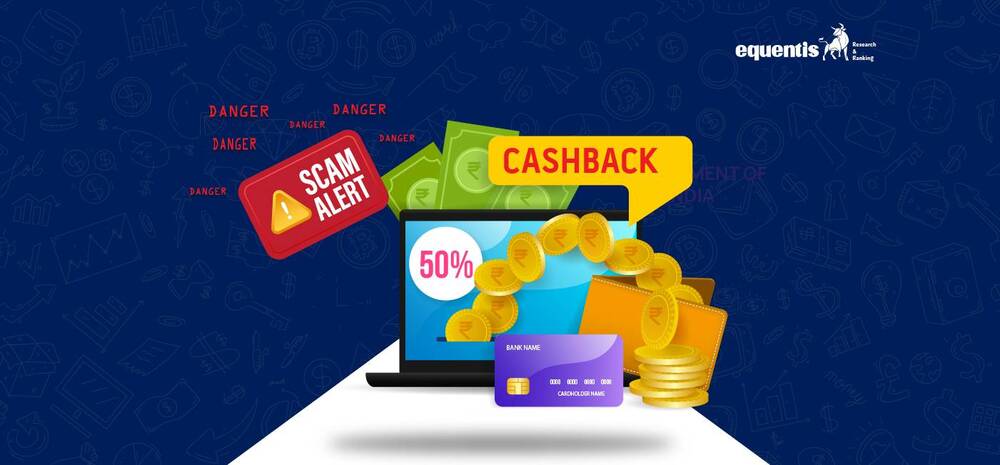A recent report reveals that many survey participants were attracted to online platforms offering cashback and subscriptions, only to find they were not compensated after signing up.
Cashback scams are on the rise in India. Fraudsters often pose as reputable brands, sending deceptive SMS messages or links on social media that promise enticing cash rebate rewards. This led many unsuspecting individuals to share their account details and lose money.
It is crucial to stay informed to protect yourself and others from falling victim to these scams. This article will help you figure out how legitimate cashback offers work and how to protect yourself from fraudulent schemes.
What are Cashback Scams?
Cashback scams involve fraudsters tricking individuals into believing they are eligible for a cashback reward, rebate, or refund. Typically, these scams start with an unsolicited communication, such as an email, phone call, or message, claiming the recipient is entitled to money back, often from a recent purchase or overpayment. The scammer then ostensibly requests personal and financial information, like bank account details or credit card numbers, to process the cash rebate.
This information is used to steal money, commit identity theft, or carry out other fraudulent activities. Victims might also be directed to click on malicious links or download harmful software, further compromising their security.
How Do Cashback Scams Usually Operate?
Such scams generally operate in the following ways:
- Deceptive Offers and Claims: Scammers often promote these scams through unsolicited messages, social media, or phishing emails. They lure victims with attractive cashback deals that promise unusually high returns or guaranteed payouts, which are often too good to be true.
- Creating Urgency: To push you into making hasty decisions, scammers may create a sense of urgency by stating that the offer is time-sensitive or has limited availability. This tactic aims to prevent you from thoroughly evaluating the offer.
- Information Theft: Once they have caught your interest, scammers will attempt to obtain your personal or financial information. This can involve getting you to click on malicious links, download harmful software, or provide credit card or bank account details under the pretense of “activating” your cashback benefits.
- Counterfeit Websites and Apps: Some scams involve guiding you to fake websites or persuading you to download fraudulent apps that seem genuine. These sites and apps may trick you into making small payments that ultimately lead to financial loss.
How Can You Avoid Cashback Scams?
The steps that you should follow to avoid and always remember while receiving unknown calls:
| No. | Tips | Description |
| 1. | Verify the Source | Always check the authenticity of the cashback offer. Look for official communications from reputable companies and cross-verify through their official websites or customer service. |
| 2. | Avoid Sharing Personal Information | Be cautious about sharing your personal and financial details. Scammers often request this information to execute their fraudulent activities. |
| 3. | Use Secure Payment Methods | Opt for secure and trusted payment methods. Avoid making payments through unverified links or platforms. |
| 4. | Read Reviews and Feedback | Research the cashback offer by reading reviews and feedback from other users. Genuine offers will have a trail of satisfied customers. |
| 5. | Be Wary of Unrealistic Offers | If a cashback offer seems too good to be true, it probably is. Trust your instincts and avoid deals that promise unrealistic returns. |
| 6. | Educate Yourself and Others | Stay informed about the latest scams and share this knowledge with friends and family. Awareness is a powerful tool against fraud. |
| 7. | Report Suspicious Activities | If you encounter a suspected scam, report it to the relevant authorities. This can help prevent others from becoming victims. |
Real-life Examples of Rebate Scams
One prominent example is the rise of fake e-commerce websites during festive seasons, a time when consumers are more inclined to make purchases. These websites offer incredible cash rebate deals to entice buyers. Once the transaction is completed, the site either fails to deliver the product or disappears entirely, leaving consumers without money or the product.
Another example involves scammers sending fake SMS messages about rebate offers from reputable companies like Paytm, Amazon, or Flipkart. These messages contain malicious links that, when clicked, lead to phishing websites designed to steal personal and financial information.
How to Avoid Such Scams?
To protect yourself from cashback scams, follow these tips:
- Research the Offer: Before making a purchase, research the rebate offers and the platform offering it. Look for reviews and ratings from other users to gauge its legitimacy.
- Use Trusted Platforms: Stick to well-known and trusted cashback platforms or retailers to minimize the risk of falling victim to a scam.
- Check for HTTPS: Ensure that the website you are transacting on is secure by checking for “https://” in the URL and a padlock icon in the address bar.
- Keep Personal Information Private: Do not share sensitive information such as bank account details, Aadhaar numbers, or passwords with unknown or unverified platforms.
- Verify Contact Information: If you are unsure about the legitimacy of a cashback offer, verify the contact information provided on the platform’s website or app.
As cashback offers continue to proliferate in India, investors must remain vigilant about potential scams. By recognizing the signs of fraudulent activity and taking proactive measures to protect their finances, individuals can mitigate the risk of falling victim to cashback scams.
FAQs
How can I differentiate between genuine cashback offers and scams?
Genuine cashback offers typically come from reputable companies with established track records. Be wary of deals that seem too good to be true or require upfront payments or personal information.
What should I do if I suspect I’ve fallen victim to a cashback scam?
If you believe you’ve been targeted by a cashback scam, report the incident to the relevant authorities, such as the police or consumer protection agencies. Additionally, notify your bank or financial institution to prevent further unauthorized transactions.
Are there any regulatory measures in place to address cashback scams in India?
While there are regulations governing financial transactions and consumer protection, cashback scams often evolve to circumvent existing laws. To avoid falling prey to fraudulent schemes, individuals need to exercise caution and conduct due diligence before participating in cashback offers.
How useful was this post?
Click on a star to rate it!
Average rating 5 / 5. Vote count: 3
No votes so far! Be the first to rate this post.
I’m Archana R. Chettiar, an experienced content creator with
an affinity for writing on personal finance and other financial content. I
love to write on equity investing, retirement, managing money, and more.
- Archana Chettiar













